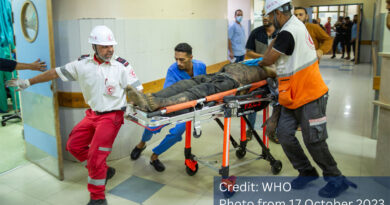Risk of disease spread soars in Gaza as health facilities, water and sanitation systems disrupted
8 November 2023 – As deaths and injuries in Gaza continue to rise due to intensified hostilities, intense overcrowding and disrupted health, water, and sanitation systems pose an added danger: the rapid spread of infectious diseases. Some worrying trends are already emerging.
Lack of fuel has led to the shutting down of desalination plants, significantly increasing the risk of bacterial infections like diarrhea spreading as people consume contaminated water. Lack of fuel has also disrupted all solid waste collection, creating an environment conducive to the rapid and widespread proliferation of insects, rodents that can carry and transit diseases.
The situation is particularly concerning for almost 1.5 million displaced people across Gaza, especially those living in severely overcrowded shelters with poor access to hygiene facilities and safe water, increasing risk of infectious diseases transmission. UNRWA, WHO, and the Ministry of Health are scaling up a flexible disease surveillance system in many of these shelters and health facilities. The current disease trends are very concerning.
Since mid-October 2023, over 33,551 cases of diarrhea have been reported. Over half of these are among children under age five a significant increase compared to an average of 2000 cases monthly in children under five throughout 2021 and 2022. 8944 cases of scabies and lice, 1005 cases of chickenpox, 12635 cases of skin rash and 54,866 cases of upper respiratory infections have also been reported.
Disrupted routine vaccination activities, as well as lack of medicines for treating communicable diseases, further increase the risk of accelerated disease spread. This is
